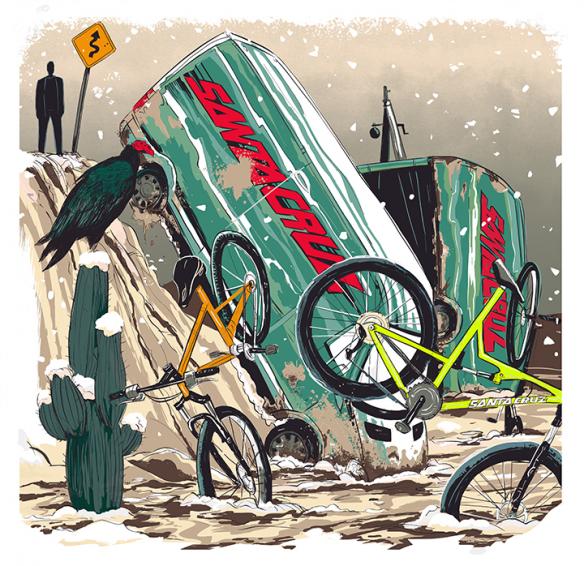A Twenty-Year Obsession: “What Falls from Trucks, from the Lips of Saviors” from issue 299.3
In the early 1990s, when I was enrolled in the MFA program at the University of Washington, I sometimes found myself sitting in traffic, chilling out to NPR, when the announcer would butt in to warn us all about a milk spill on I-405, or how a bunch of chickens were running around along Highway 18. For some reason, I always found that these proclamations knocked me out of commuter mode and straight into a poem-making alertness. I began collecting spill stories—cheese, beer, bees. Around that time I was in my usual merging lane onto I-5 South when I was halted by a bunch of guys in hazmat suits hosing down a stretch of road strewn with blood and goopy innards. I grabbed my notebook and scribbled down a few lines about the souls of animals plastered all over the road. Sadly, those notes never materialized into a poem, but I never lost my fondness for road spills, or the memory of how difficult the clean-up job appeared to be. Eighteen years later, I found myself sitting at my desk, gearing up to write. It’s often unpredictable where a writing session will lead me, so I don’t exactly remember what prompted me to Google truck spill. A few clicks, and I found everything from shoes to bull semen. Jackpot! I also had Jesus on my mind that day. I was researching the miracles attributed to him—loaves and fishes, healing the lame, etc. Thanks to the bizarre way my mind works, when I started drafting a poem containing raw sausage and dumped Smuckers, The Savior suddenly appeared as the one in charge of clean-up, though I guess by the end of the poem it’s pretty clear he doesn’t quite have a strong enough Jet Vac to clean up the mess we’ve all managed to make.
In general, my writing practice demands that I send my editor off to do errands before I write a single word. Without him/her around to question my sanity, I can take more risks but also, if need be, resort to placeholders—clichés, weak images, hopeful but ultimately dud metaphors I’ll fix later. My goal is to fill pages with wild associations, to avoid making logical sense but instead mix word concoctions like a mad scientist. Instead of bolts of electricity and a dead man, I use words. Often I’m borrowing from other texts, in this case the Bible and truckspill.com. What I’m mainly trying to do is relieve myself of the urge to write a poem. Usually, within an hour of this phase I run out of steam—that’s what happened with “What Falls From Trucks.” I walk away, and I don’t come back for at least a couple of days, when I can look at what I’ve written a bit more critically, tightening lines (losing connectors), choosing more accurate and alliterative words (thesaurus.com to the rescue), heightening momentum and suspense with stronger line breaks, or reorganizing/re-envisioning events.
If you compare the first and final versions, you will see I cut “On April 2, 2009, on I-471.” Why? Because it’s not important what day it was, or what highway—the important thing, especially at the beginning of a poem, is to get to the action: establish setting, then let those cotechini drop! In the earlier version I had “raw sausage” sliding out of a truck. It’s my belief that in most cases it’s best to be specific, so I chose cotechini. I also swapped out, for alliterative purposes, “busy roadway” for “rush-hour roadway.” In fact, I did this type of swapping out all through the poem: “puke-red mojito” became “puke-red slush” so the slush could ring off “slipped” and “sweeping.” I wanted more similar sounds—assonance, consonance, and slant/internal rhyme. “Jet Vacs descended, sucking up the innards” sounds okay, but I wanted more r’s, so I changed it to “Jet Vacs rescued the route,” which plays nicely with “rush-hour roadway, rain. . . red.” This is often how I work, like a self-guided search and replace feature, replacing non-alliterative words with ones that zing off each other like stray bullets: “dumped delicates and lava, brought to their doom dozens of goats.” Hear all those ds and those ahhs, oohs, uhs and ohs? All intentional, and so are the “goat guts” and the “dripping blood bedabbled.” I’m cuckoo for musical language; it’s like doing a crossword puzzle.
The hardest part for me is ending a poem. I just kept writing and rewriting, playing around with the notion of Jesus doing the resurrecting, performing miracles and such, and all of a sudden up comes “Sweet Jesus!” It was this inevitable moment, more about transcription than will or conscious choice. The best thing I could do was get out of the way and let the poem finish itself.
It took me about two years to get from the first draft to the final version, with many magazine rejections along the way. Instead of giving up, I kept revising—compressing the language, improving the music, fussing with the line breaks. On one of the last days of 2013, I got the email from Jeremy Schraffenberger that “What Falls from Trucks, from the Lips of Saviors” had been accepted by North American Review. As this poem takes a big risk with the way it portrays Jesus, not to mention my bizarre obsession with road litter, I felt a particular triumph.
Martha Silano's most recent books are Reckless Lovely (Saturnalia Books 2014) and The Daily Poet: Day-By-Day Prompts For Your Writing Practice (Two Sylvias Press 2013). Martha edits Crab Creek Review and teaches at Bellevue College. "What Falls from Trucks, from the Lips of Saviors" appears in North American Review's most recent issue, 299.3, Summer 2014.
Illustration: Ryan Inzana is an illustrator and comic artist whose work has appeared in numerous magazines, ad campaigns, books and various other media all over the world. His graphic novel Ichiro was the honor selection for the Asian/Pacific American award for young adult literature and was also nominated for an Eisner. You can see more of his work at www.ryaninzana.com. Most recently, Ryan has contributed an animated comic adaptation of Issac Asimov’s short story Nightfall to the July iPad edition of Popular Science magazine. It is now available on iTunes: http://lnkd.in/dcWm-kT
Recommended
Nor’easter
Post-Op Appointment With My Father
Cedar Valley Youth Poet Laureate | Fall 2024 Workshop






